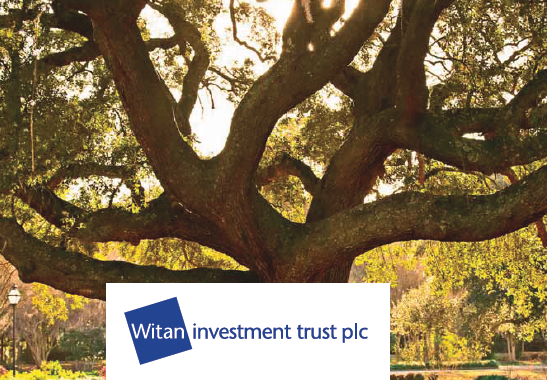Witan Investment Trust (WTAN) says its CEO Andrew Bell intends to step down this year after 14 years in the job. The board is taking this opportunity to review Witan’s management arrangements as well as beginning the search for his replacement.
[QD comment: It has to be acknowledged that the trust’s returns have been poor. Over 10 years, its NAV returns are the second-worst in the sector (only ranking ahead of Keystone which made a disasterous switch from ‘value’ to ‘growth’ at precisely the wrong moment). More importantly, Witan’s returns are consistently behind those of Alliance Trust and F&C, its closest competitors. A radical change of approach may be required.]
Witan Investment Trust (WTAN) has released its annual results for the 12 months ending 31 December 2023.
- Witan reported a NAV total return of 12.7% and share price total return of 10.1% for the 12 months, compared to the 14.7% return of its benchmark, the MSCI ACWI index.
- Witan’s core portfolio managers (c.75% of Witan’s portfolio) collectively outperformed the MSCI ACWI over the period, however its overall performance was dragged down by its investments in the GMO Climate Change Investment Fund and specialist investment companies.
- There was no change to Witan’s delegated manager over the period. It did increase its investment in GMO Climate Change Investment Fund after a period of poor performance, with the fund rallying in the latter parts of the year.
- Witan declared a full year dividend of 6.04p per share, a 4.1% increase on the prior year, and the 49th year of consecutive dividend increases.
- Witan finished the year on a 7.8% discount, widening from the 5.4% of the prior year end. The board repurchased 54m shares over the period, 8.0% of the circulation.
Andrew Bell, Witan’s CEO, commented:
“The world economy could be described as either reaching the end of one economic cycle or entering the beginning of another. A surge in inflation, associated with measures enacted to offset the pandemic and exacerbated by the supply disruptions caused by the same pandemic, appears to be over. Stimulating demand at a time when supply was under pressure has not proved to be a winning formula. However understandable at the time, it has required some cleaning up by the central banks.
“Rather than speculating about how high discount rates will go and how much collateral damage will be sustained by asset prices and those who took on too much leverage at low rates, investors will be more inclined to look through current conditions towards an economic upswing in 2024-25, when financing costs and demand conditions may well be better than at present. Rather than worrying about how economic growth rates might slow in 2024, necessitating a defensive approach, time is on investors’ side if the future is seen as brighter and the cost of waiting reduces.
“With the nature of growth in the coming decade shifting towards more resource-intensive areas (infrastructure renewal, new energy investment, defence) inflation seems likely to be higher in coming years than in recent decades. Indebted governments will also have more of a bias to growth (and slightly higher inflation) as the most plausible way to reduce their debt burdens, avoiding explicit default. Consequently, a return to the recent anomaly of zero (or negative) interest rates appears unlikely, as markets price in the risk of a structurally higher inflation rate than the 0-2% which has characterised much of the century so far.
“Event risk is always an issue, however hard to evaluate. 2024 sees a record proportion of the world’s population taking part in elections of various kinds. Some might produce changes in a given country (e.g. Argentina in 2023), others might have ramifications elsewhere (e.g. the US) or prompt reactions from other countries (e.g. Taiwan). Given unresolved global conflicts and a lack of sure-footed and secure political leadership to handle them, there is no shortage of potential geopolitical shocks. The fact that the days lengthen from December to June does not guarantee trouble-free weather on the way. Consequently, alongside a generally positive view of the world’s medium-term prospects, a heavy dose of watchfulness is warranted.”
WTAN : Witan is up for grabs with CEO stepping down
